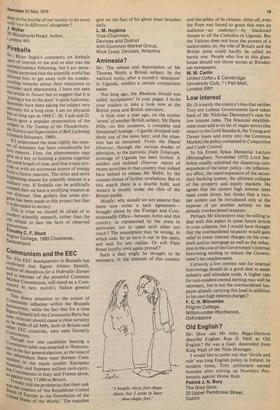Low interest
Sir: It is surely the country's loss that neither Tory nor Labour Governments have taken heed of Mr Nicholas Davenport's case for low interest rates. The financial establishment must add to its list of major errors (the return to the Gold Standard, the Young and Dawes loans and entry into the Common Market) the policy contained in Competition and Credit Control.
In his Ernest Sykes Memorial Lecture (Birmingham, November 1975) Lord Seebohm readily admitted the disastrous consequences of the latter policy—its inflationary effect, the rapid expansion of the secondary banking system, the ultimate collapse of the property and equity markets. He agrees that the current high interest rates must come down, but thinks that a twotier system can be introduced only at the expense of yet another subsidy on the already overburdened taxpayer.
Perhaps Mr Davenport may be willing to deal with this aspect in some future article in your columns, but I would have thought that the overburdened taxpayer would gain relief in lower interest charges on his overdraft and/or mortgage as well as the reduction in the cost of the Government's internal borrowing tending to reduce the Government's tax requirements.
, Certainly a low interest rate for internal borrowings should do a good deal to assist industry and stimulate trade. A higher rate for non-resident-owned sterling may well be necessary, but is not the overburdened taxpayer already carrying this load in addition to his own high interest charges?
F. C. H. Witcombe
Pilgrim Cottage, M ilton-under-Wychwood, Oxfordshire


































 Previous page
Previous page